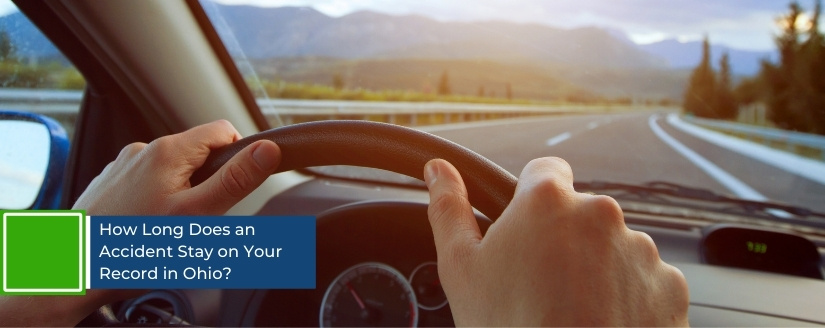Ohio Driving Records: How Long Do Accidents Show Up?

Are you recovering from a recent accident in Ohio and wondering, “How long do accidents stay on your record?” You might also have questions about how the accident will affect your car insurance rates and what steps you can take to limit the impact. An accident lawyer can help you understand the rules that apply to crashes on your driving record in Ohio and how you can plan your next steps to avoid surprises.
How Driving Records Work in the State of Ohio
An Ohio driving record is an official document from the Bureau of Motor Vehicles (BMV). It includes any moving violation convictions, crash reports, and license-related actions for a driver from the past three years. Courts, law enforcement, insurance companies, and certain employers can request this record.
How Long Do Accidents Stay on Your Driving Record in Ohio?
In Ohio, all accidents stay on your driving record for 36 months (three years) from the date of the crash. The BMV records every driver and vehicle owner involved in a crash, regardless of fault or severity. Minor fender benders and major collisions both remain for the same length of time. The BMV does not determine fault. However, if a driver’s record has a moving violation conviction on the same date as an accident report, it could suggest that the driver was at fault.
How Long Do Accidents Stay on Your Insurance?
Most insurance companies review the last three to five years of your driving history when setting rates. An accident could increase your car insurance premiums by 20 to 50 percent, depending on crash severity and fault. Not-at-fault accidents can still appear in your record and influence your rates. However, the effect of an accident on your rates usually decreases over time. Each insurance company decides how to weigh the information in its own rating system.
Why Not All Accidents Are Treated the Same
Car insurance companies look at several factors when reviewing an accident. They consider whether you were at fault, the severity of crash-related property damage or injuries, and whether the police or the BMV recorded the event. If you received a ticket or arrest in connection with the crash, your provider may increase your rates. Your driving history also matters. A driver with no previous accidents or violations on their record might see a smaller increase. Some insurers also offer accident forgiveness, which can prevent the occasional accident from increasing your rates.
Can You Remove an Accident from Your Record in Ohio?
No, you cannot remove an accident from your official driving record before the 36-month retention period ends. The BMV keeps the record for every driver or vehicle owner involved in a reported crash, whether the accident was minor or serious, and whether or not you were at fault. However, if an accident appears on your record due to a reporting error, you can contact the BMV to correct it. You will need documentation that proves the error, such as police or court records.
How to Reduce the Impact of an Accident on Your Insurance
You can take several steps to limit the effect of an accident on your auto insurance rates:
- Ask your insurer if they offer accident forgiveness for your policy.
- Shop around for quotes from other companies, as each uses different rating factors.
- Take a state-approved defensive driving course to show you are committed to safe driving.
- Maintain a clean record after the accident to reduce risk in the eyes of insurers.
- If the claim was not your fault, provide full documentation to your insurance company.
FAQs About Accidents and Driving Records in Ohio
Accidents and violations on your driving record can affect both your license status and your insurance rates. Many Ohio drivers have questions about how long these records last and how insurers use them. Here are some straightforward answers to frequently asked questions on this topic.
Will one accident raise my insurance forever?
No. Most insurers use a three-to-five-year lookback period when calculating rates. An accident might increase your premiums for several years, but the increase will usually go down over time if you keep a clean driving record afterward. Factors such as fault, crash severity, and your driving history will affect how much your rates change and for how long.
Can I get a ticket removed from my Ohio driving record?
Ohio law requires the BMV to keep moving violation convictions for 36 months from the conviction date. The law doesn’t provide a mechanism for early removal of a ticket, though a court might agree to remove a conviction from your record if it is vacated or dismissed.
Do insurance companies see all accidents?
Insurers can see all accidents recorded by the BMV during their lookback period, regardless of whether you were at fault for those wrecks. Participating insurers can also see any insurance claims you have filed in the past through industry tools like the CLUE (Comprehensive Loss Underwriting Exchange) report. Not-at-fault accidents can still influence your rates because insurers set their rates by measuring the likelihood of future accident claims, not just fault.
Does Ohio have accident forgiveness laws?
Ohio does not have a state law requiring accident forgiveness. However, some insurers offer accident forgiveness as part of their policies. This coverage can prevent certain accidents from raising your rates, as long as you meet the insurer’s eligibility rules. You must have this coverage in place before the accident occurs to be eligible for forgiveness. If you want accident forgiveness, you should confirm with your insurer whether they offer it and how it works.
Contact Our Ohio Car Accident Attorneys to Learn More
If you have concerns about your record, Amourgis & Associates, Attorneys at Law can help. Our team can review your case, explain your options, and answer your questions about accidents and driving records in Ohio. Contact our Ohio car accident attorneys today for a free initial consultation. We will listen to your concerns and give you clear information so you can make informed decisions.







